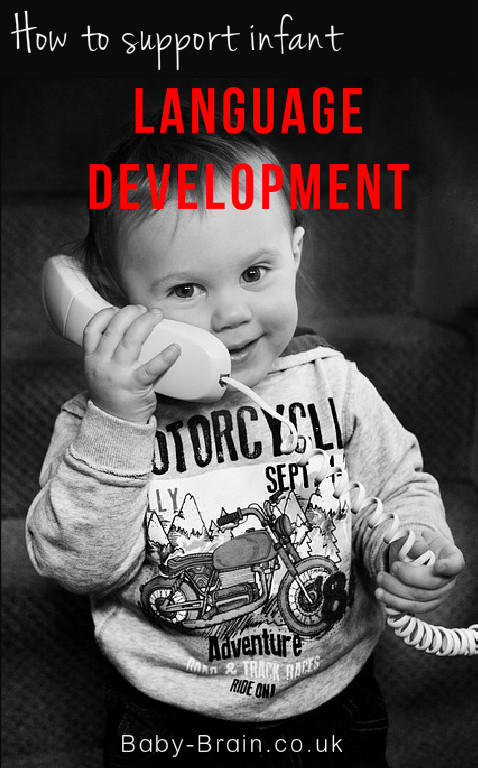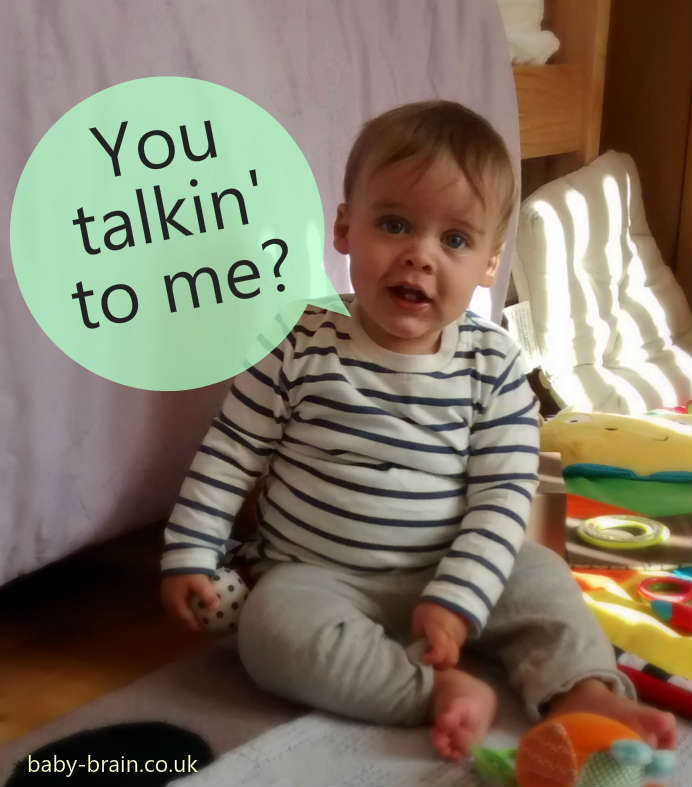What was your child’s first word? What words are “normal”?
This article discusses: first words – speech development at 6-12 months and 0-6 months, tips to support and encourage development at 12 months, the importance of talking to and around infants
Just came across this list of first words with examples from a number of children, and the story behind them. Here are a few:
-
Oscar – Oscar is the cat next door. When Oscar comes in to the house, he always says ‘hello’ to the baby
-
Pop – When a balloon she was holding burst she copied the word pop
-
Book – As her parents used to look through books with her and repeatedly tell her what they were
-
Duck
-
Quack quack– baby started saying quack quack when her parents played with her rubber duck in the bath. Now she gets very excited whenever she sees ducks or chicks in books
-
Hat – As she loved putting on hats
-
Bear – As mum’s old bear was always on her bed
-
Fish – He loved watching fish in his friend’s aquarium
-
Samich (sandwich)- His mother was standing at the kitchen counter right beside him when baby reached up and said “samich”
So looks like first words can really vary. I think that the Little Lovely might have said “dada” first, but also he was saying a few other things like “kiss”, and “fish” because we went to an aquarium and I kept saying look at the fish, the fish, a lot. By the end of it, he was saying fish. Quack was also an early favourite.
Monitoring and encouraging first words
Baby’s First Word – an initiative from the National Literacy Trust (see the Words for Life website) – you can download a pack from here that has a series of templates to monitor first words and more information. The pack includes:
Everything you need to get involved in Baby’s First Word, including a step-by-step guide, poster and hand-out for parents.
How does speech develop?
Talking Point, a site that gives some good information and resources on children’s communication writes that children develop skills at their own pace but some general things that you might see between 6 months and 1 year are that children will:
- Listen carefully, and turn to someone talking on the other side of the room.
- Look at you when you speak and when their name is called.
- Babble strings of sounds, like ‘no-no’ and ‘go-go’.
- Make noises, point and look at you to get your attention.
- Smile at people who are smiling at them.
- Start to understand words like ‘bye-bye’ and ‘up’ especially when a gesture is used at the same time.
- Recognise the names of familiar objects, things like ‘car’ and ‘daddy’.
- Enjoy action songs and rhymes and get excited when sung to.
- Take turns in conversations, babbling back to an adult.
How to encourage and support your child 12 months:
encourage your child at this stage:
- Make different sounds to interest your child. This can be the sound of your voice or things like a rattle or squeaky toy.
- Pointing to sounds will help develop your child’s listening skills. This will also help their awareness of the world around them.
- Encourage your child to look at you during activities. This could be dressing, feeding or nappy changing. This will help your child’s attention and communication skills.
- Talk about everyday activities, like getting dressed, eating and bathing.
- Copy your baby when they are babbling. This is a very good way to show how to take turns in communication. This will encourage them to make even more sounds.
- Use actions with words. Try waving as you say ‘bye-bye’ or picking up their cup as you say ‘drink’. This will help your child to relate what they see and do with language.
- Sing action songs and play games like ‘peek-a-boo’ to encourage communication and attention skills.
- Have some special time with your child each day to play with toys and picture books.
Talking about everyday activities with babies is important.
Research (1) has also shown that while reading to baby and showing them pictures did contribute to cognitive development in terms of increasing scores on problem-solving and communication scales of a test, more substantial effects were found for:
the more informal activity of frequently talking to the infant while doing other things; and this was observed for both communication and problem-solving.
Reading was shown to increase both problem-solving and communication, showing pictures only had a positive effect on communication scores, but talking had a more substantial effect than both reading and picture showing.
But will baby understand when I talk to them?
Babies at 6 months have been shown to understand that concept of speech (2) – i.e. that speech is used to communicate information (rather than random, interesting sounds that come out of our mouths). They also prefer speech over other sounds (3)
Younger babies
How children develop speech and language between 0 and 6 months (quote from talking point)
by 6 months, usually children will:
- Turn towards a sound when they hear it.
- Be startled by loud noises.
- Watch your face when you talk to them.
- Recognise your voice.
- Smile and laugh when other people smile and laugh.
- Make sounds to themselves, like cooing, gurgling and babbling.
- Make noises, like coos or squeals, to get your attention.
- Have different cries for different needs. For example one cry for hunger, another when they are tired.
How to support the child at this stage:
-
Mirror/copy the sounds baby makes – it’s the start of a conversation and will encourage more sound making
-
Ensure baby can see your face clearly when you talk to them. Newborn visual range is not that great and vision is developing the first months, so maybe move a little closer to talk to them. Eye contact is important for language development.
-
As with 12 month olds, talking to baby about what you are doing is important as they will hear and start to learn words.
-
I didn’t even know my Little Lovely was paying attention until one day he copied a word that I had been saying, or I was talking about brushing my hair and then he made a motion on his own head like he was brushing his hair. He was listening to me, all along but with no verbal feedback from him before that point, I didn’t realise just how much he was taking in.
-
-
Talking point suggests using a “sing-song” voice with baby to keep them interested in what you are saying. An article on music and child development that baby-brain wrote recently also highlighted the usefulness of singing with baby:
-
Singing is important for vocabulary development: “Singing songs teaches children about how language is constructed. When you sing, words and phrases are slowed down and can be better understood by your baby. Singing regularly will help your baby to build up a vocabulary of sounds and words long before they can understand the meaning”, according to this article from the BBC.
-
Some links to other resources
Talking Point website
Talk to you baby – from the Words for Life website
More tips here, from the NHS on “helping your child’s speech”.
A video from the NHS on “how can I help my child to start talking? (12 to 30 months)”
References:
- Murrary, A., & Egan, S. (2014). Does Reading to Infants Benefit their Cognitive Development at 9-months-old? An Investigation using a Large Birth Cohort Survey. Child Language Teaching and Therapy, Vol. 30, No. 3, October 2014, pp.303-315
- Vouloumanos, A., Martin, A., & Onishi, K. H. (2014). Do 6-month-olds understand that speech can communicate? Developmental Science, pp 1–8
- Vouloumanos, A., & Werker, J.F. (2004). Tuned to the signal:the privileged status of speech for young infants. Develop-mental Science. 7 (3), 270-276


